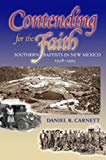
Contending for the Faith: Southern Baptists in New Mexico, 1938-1995 PDF
240 Pages·2002·49.4426 MB·other
Most books are stored in the elastic cloud where traffic is expensive. For this reason, we have a limit on daily download.
Preview Contending for the Faith: Southern Baptists in New Mexico, 1938-1995
Description:
How did a southern evangelical religion, culturally, racially, and geographically homogeneous, become the largest Protestant denomination by 1960 in a region as diverse as New Mexico? And why did the Baptist Church's growth in New Mexico level off after the mid 1980s? In examining these two questions, historian Daniel Carnett connects the answers to national trends in the history of Protestant America in the twentieth century. The Baptists worked hard to provide social and religious services throughout New Mexico in an effort to increase their membership. By the 1960s they managed to create a religious climate where nearly one out of every two Protestants in the state was a Baptist. But after the cultural transformations of the 1960s, the Baptists appeared out of harmony, even in conflict, with a more relativistic world. Today, Carnett argues, Baptists in New Mexico and around the United States are again trying to adapt to the world around them, but in the process they are being shaped more by the culture than transforming it. Their shift in focus to helping people cope with the difficulties of modern life at the expense of theology alienates as many Baptists as it converts new ones.
See more
The list of books you might like
Most books are stored in the elastic cloud where traffic is expensive. For this reason, we have a limit on daily download.
